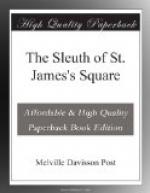What he wished to say, he could control and, therefore, could accurately present — but what was said to him began in the distant language.
“What Major Carstair did,” he said, “it has not been made clear to you?”
“No,” she replied, “I do not understand.”
The man seemed puzzled.
“You have not understood!”
He repeated the sentence; his face reflective, his great bare head settling into the collar of his evening coat as though the man’s neck were removed.
He remained for a moment thus puzzled and reflective. Then he began to speak as one would set in motion some delicate involved machinery running away into the hidden spaces of a workshop.
“The Dalai Lama had fallen — he was alone in the Image Room. His head striking the sharp edge of a table was cut. He had lost a great deal of blood when we found him and was close to death. Major Carstair was at this time approaching the monastery from the south; his description sent to us from Lhassa contained the statement that he was an American surgeon. We sent at once asking him to visit the Dalai Lama, for the skill of Western people in this department of human knowledge is known to us.”
The Oriental went on, slowly, with extreme care.
“Major Carstair did not at once impress us. `What this man needs,’ he said, `is blood.’ That was clear to everybody. One of our, how shall I say it in your language, Cardinals, replied with some bitterness, that the Dalai Lama could hardly be imagined to lack anything else. Major Carstair paid no attention to the irony. `This man must have a supply of blood,’ he added. The Cardinal, very old, and given to imagery in his discourse answered, that blood could be poured out but it could not be gathered up . . . and that man could spill it but only God could make.
“We interrupted then, for Major Carstair was our guest and entitled to every courtesy, and inquired how it would be possible to restore blood to the Dalai Lama; it was not conceivable that the lost blood could be gathered up.
“He explained then that he would transfer it from the veins of a healthy man into the unconscious body.”
The Oriental hesitated; then he went on.
“The thing seemed to us fantastic. But our text treating the life of the Dalai Lama admits of no doubt upon one point — `no measure presenting itself in extremity can be withheld.’ He was in clear extremity and this measure, even though of foreign origin, had presented itself, and we felt after a brief reflection that we were bound to permit it.”
He added.
“The result was a miracle to us. In a short time the Dalai Lama had recovered. But in the meantime Major Carstair had gone on into the Gobi seeking the fantastic treasure.”
The girl turned toward the man, a wide-eyed, eager, lighted face.
“Do you realize,” she said, “the sort of treasure that my father sacrificed his life to search for?”




